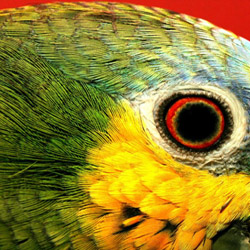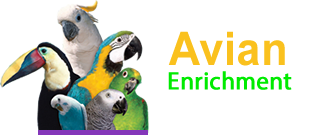Avian Senses and Survival
 How birds perceive the world around them determines their many choices and behaviors, including foraging, predator avoidance, mating and flight. Birds rely on their senses to aid in their survival. A parrot's visual and auditory senses are the most critical to their survival and as such, are the most well developed of the senses. Conversely, a bird's sense of smell and taste are less critical to their survival and are less developed.
How birds perceive the world around them determines their many choices and behaviors, including foraging, predator avoidance, mating and flight. Birds rely on their senses to aid in their survival. A parrot's visual and auditory senses are the most critical to their survival and as such, are the most well developed of the senses. Conversely, a bird's sense of smell and taste are less critical to their survival and are less developed.
A Bird's Eye View
Vision is a parrot's most critical sense as it is important for their ability to survive. It is typical for prey animals to have their eyes spaced widely on their head and this is the case for parrots. With their eyes placed on the side of their heads, they are better able to monitor movement from all angles and they have close to 360° view. A few other interesting facts about a parrot's eyesight are:
- Birds have eyeballs that are relatively large in comparison to the size of their head.
- Parrots have two fovea per eye, which operate independently. This enables them to focus on more than one object at a time.
- The lateral placement of their eyes results in a limited binocular field. This means that parrots have poor depth of field perception.
- Birds have the ability to focus much faster than other animals.
- Birds close their upper and lower eyelids only to sleep.
- Birds have a transparent third eyelid for blinking that sweeps across the eye from the inside to lubricate and clean the cornea. The transparency of this eyelid helps them to remain aware of their surroundings.
- Night vision is poor in parrots making them more vulnerable to attack at night from owls and bats.
- Compared to humans, parrots can distinguish more colors and see a wider range of colors due to their ability to distinguish UV light.
Do They Hear What I Hear?
The ability to hear is very important to a bird's existence in the wild, especially since they often rely on communications between flock members to warn of predators. Here's a few facts:
- Birds can hear a smaller range of sound than humans. Birds are less sensitive to the high and low ends of the frequency range.
- Birds can distinguish rapid fluctuations in pitch and intensity much better than humans can. The replay speed of a bird's call would have to be slowed by a factor of 10 for us to be able to discern all the details a bird can hear.
- Parrots don't have external ear structures but they do have inner ear three chambers just like we do.
- A parrot's middle ear has only one bone versus the three bones (Hammer, Anvil and Stirrup) found in human ears.
- Specialized feathers (auriculars) surround the ear opening that protect the ear opening without blocking the sound.
Can Parrots Distinguish Odors?
For many years, birds were considered to have a poorly developed sense of smell. Recent research has rejected that hypothesis. Although there haven't been parrot specific studies in regards to their olfactory abilities, it has been documented that the sense of smell is critical to many other species for routine tasks such as navigation, foraging and mating.
How Discerning is a Parrot's Palette?
Compared to humans, a parrot's sense of taste is very limited but as we all know, they do have definite likes and dislikes.
- Birds typically have fewer than 100 taste buds in comparison to about 10,000 in humans.
- A bird's sense of taste may be used to help them avoid harmful foods.
- A distinct oddity of a bird's tongue is that it has a bone in it that runs the full length.
- Because a parrot's tongue is hardened on the end, the taste buds are located at the back of the throat and the base of the tongue.
Touch
A bird's skin has sensory nerve endings that detect temperature, pressure and pain.







Comments powered by CComment